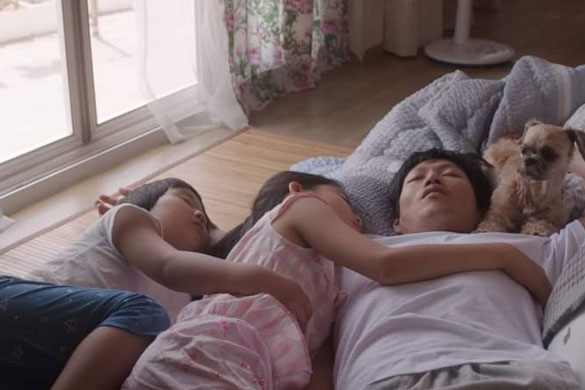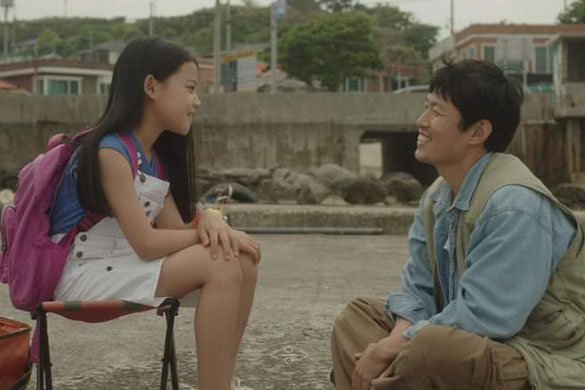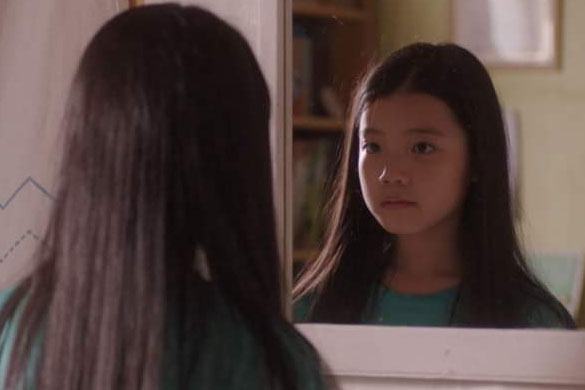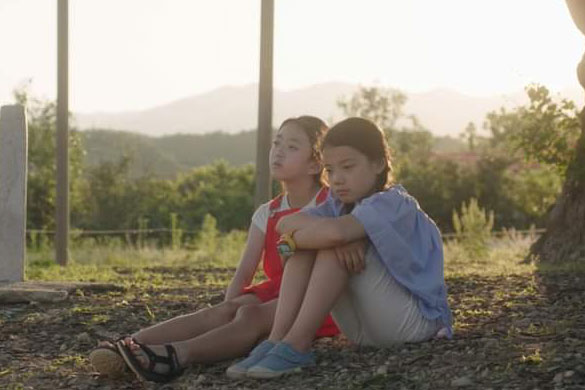
 |
||||
Bori is an 11 year old girl living with her parents and younger brother in a seaside village. While she is a fully able-bodied child, she is the only one in her household who can hear – her mum, dad and sibling all being profoundly deaf – Bori taking it upon herself to make their lives easier by conversing with others on their behalf and ordering takeaway pizza and fried chicken over the phone, and the like.
Review: Over the years, Korean cinema has tackled the subject of disability in a number of ways such as critiques of societal prejudice, persecution or indeed abuse from those shockingly feeling that the less than able-bodied should neither be seen, heard nor listened to (Oasis, The Peach Tree, The Crucible); discussions of the intelligence of the physical challenged, veiled so often for those who can’t (or won’t) look beyond surface physicality or visual aspects of neurological conditions (Lovable, Innocent Witness); depictions of the struggles faced by the handicapped in trying to have as normal an existence as possible (Planet of Snail); and the like. Regardless of individual narratives, social commentaries or societal critiques they contain, films of this ilk tend to put disability and disabled characters at their stories’ very centre to make the hugely important point that for the handicapped themselves disability is far from being their core, their physical or neurological issues being just a part of who they are and certainly not defining them, in spite of the close-minded's blinkered, uninformed assumptions to the contrary. Bori (the film) does a 180 on this by showing disability from the titular, able-bodied character’s perspective. Sure, even as a very young girl, Bori is fully aware of the concept of handicap and of course realises her parents and brother are deemed disabled by society at large (by definition) but from her personal point of view, as is the case for any child in a loving family, her home life is absolute normality – nothing remarkable about it; nothing odd about it (a slight addendum to that is coming, but we’ll deal with that when we get to it). Even though her life and interactions outside and away from her home are those of a non-disabled, fully hearing person, her home life interactions with her deaf family are as they have always been and as such they feel completely ordinary to her – her conversing with her parents and brother by using sign language or writing is not even noteworthy from her perspective (whether she is consciously aware of it or not) and is certainly not considered interaction with disabled people - to her, conversations with her family simply happen in a way that allows all involved to be able to understand and be understood. Think back to your youth (or my youth) and imagine sitting in your bedroom listening to a new vinyl/DVD with headphones on. Your mum opens the door and lets you know that dinner’s ready without you needing to even take the headphones off. That’s exactly how Bori views her familial interactions – their 'headphones', if you will, are permanent but they define her loved ones no more than yours defined you in your bedroom in your younger days. As such, in telling its story of a non-disabled little girl with deaf parents (as supporting characters), Kim Jin-yu’s Bori from the very outset quietly yet deftly underlines that 'disability as an aspect, not a definition' statement throughout to easily an equal degree to Korean cinema narratives over the years focusing on the perspective of the handicapped, and that is a huge strength and plus point in its favour especially in a film so seemingly simply told, from a cursory glance.
The previously mentioned addendum to all this comes with Bori’s growing belief, in looking at the closeness between her parents and brother, that their relationship with him is warmer and more unconditional than their relationship with her. Her jealousy of that drawing her towards the idea of and the wish to become deaf herself in the hope her parents will feel closer to her underlines all of the above in terms of her perception of familial normality rather than her even considering the issue of deafness as a disability per se. In a myriad of narratives dealing with handicap, stories first point to the disability in question as an explanation of why the disabled are outwardly seen and deemed as being entirely different and separate from the able-bodied specifically (again, more often than not from disabled characters' points of view), to then gradually look below the surface to show that in terms of being human we're all the same regardless of our individual challenges. In the case of Bori (the film), making non-disabled Bori (the girl) feel that she’s the one that’s different from the rest of her (again, ordinary but deaf) family members; depicting her yearning for deafness to fit in; but ultimately showing that her hearing in no way separates her from her mum, dad and brother is a perfect inversion of this trope that, with palpable originality, nonetheless leads to the same important ultimate statement,
Setting Bori’s narrative in a seaside location easily allows for a far gentler tone than would have been the case in a bustling metropolis, the less hectically-driven lives of the villagers, and of course Bori’s family, similarly setting the pace and allowing the narrative to naturally breathe. Nothing is rushed here, nor should it be, and that works in the film’s favour to a noticeable degree with Bori’s personal arc and increasing feelings that she’s an outsider in her own home allowed to progress in a measured, unhurried manner.
BORI (나는보리) / 2018
This review of BORI comes as a result of the film's screening as the Closing Gala of the 2020 London Korean Film Festival. Here is the official trailer (with English subtitles):
|
||||
All images © M-Line Distribution Review © Paul Quinn |
||||



